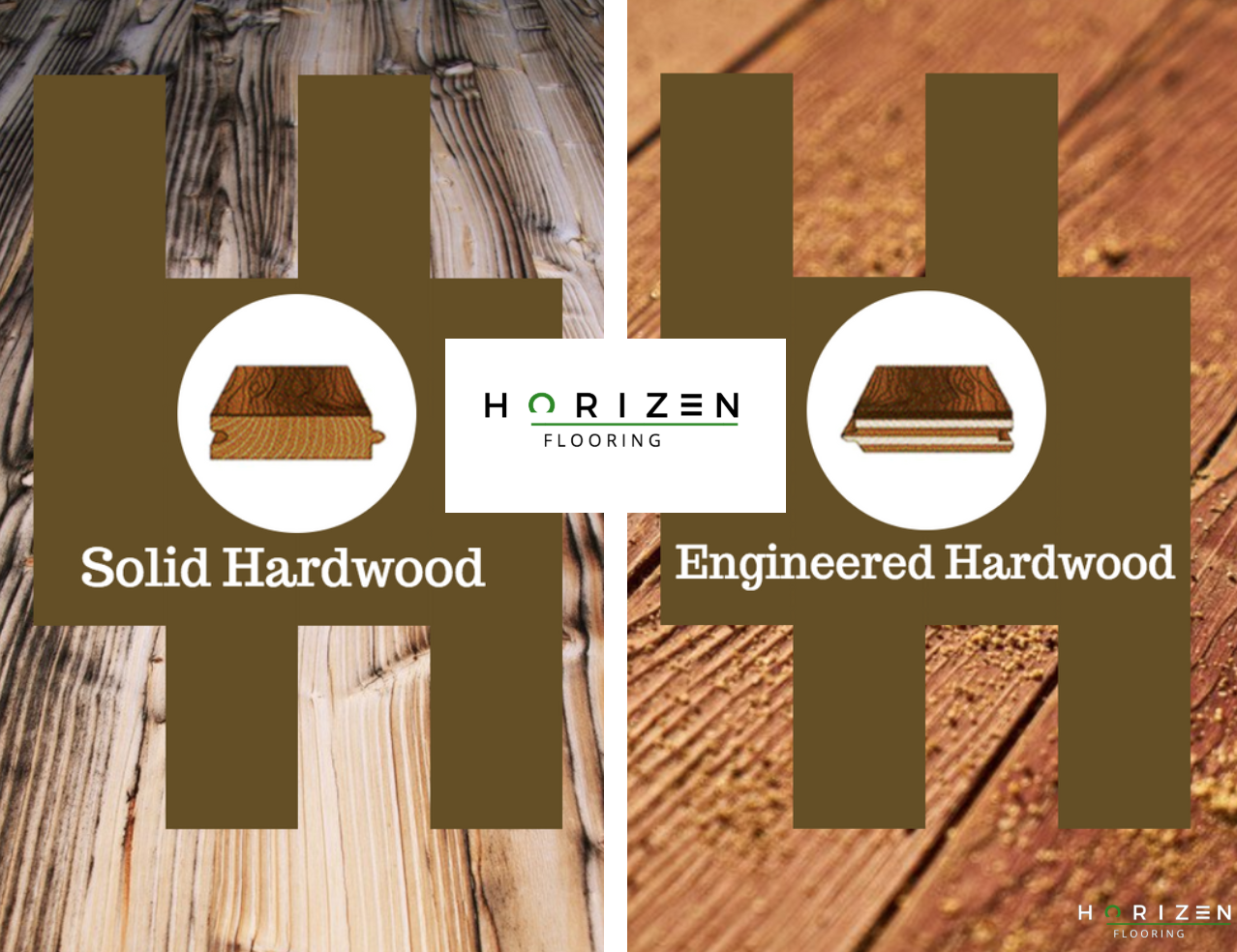You finally decided to invest money for home-improvement. You begin researching on different types of flooring options, like most homeowners do, and decided that you have always wanted hardwood flooring in your home. It brings back the days when you were younger, where the nicer homes in the neighbourhood you grew up in had hardwood floors. Since then, hardwood flooring in a home has always been on your mind when it came to designing Your home.
After sharing with your close friends and family about your search for hardwood flooring, a friend or family member who had experience with hardwood flooring would have excitedly shared with you about what they knew and learned through the experience of looking for their very own flooring. You hear them throw in terms such as “Solid Hardwood”, or “Solid Wood”, and then you also hear the term “Engineered Flooring”, or “Engineered Hardwood”. You find yourself more confused than before. Questions begin popping in your head such as: Which is better? Solid Hardwood or Engineered Hardwood?
The purpose of this flooring article today is to introduce to you the key components, pros and cons, between Solid Hardwood and Engineered Hardwood.

Solid Hardwood vs. Engineered Hardwood. Which is better?
The Way it is Manufactured:
Solid Hardwood is manufactured from a singular piece of wood, which is why each plank is a full solid piece. The most widely used profile for Solid Hardwood is called Tongue-and Groove (T&G), and the common thickness for a solid hardwood plank is ¾”.
Engineered Hardwood consists of 2 or more layers. The topmost layer is called the wood Veneer (also known as wear layer). At Horizen Flooring, we recommend to have a veneer at least 1.5mm. The lower layers consist of either Solid wood, Plywood, or High-Density Fiberboard (HDF). These layers are bonded together under specialised pressure. Common profiles for Engineered Hardwood are either Tongue-and Groove (T&G) or a Click-Locking Technology.
Physical Properties:
Solid Hardwood responds to air humidity variations because it is a 100% natural product. During warm and humid summers, it is not unusual for the wood to expand, and during cold and dry winters for the wood to contract. If the room temperature and humidity levels are not kept within optimum range, minor gapping or cupping may occur seasonally. It is recommended for relative indoor humidity levels to be kept between 45-55% throughout the year, to reduce the amount of movement and and seasonal gapping from becoming noticeable.
Engineered Hardwood flooring has enhanced internal balance and reduced possibility of twisting or warping because of the cross-layers of real wood and/or plywood used for middle and bottom layers. Seasonal movement is minimal, and dimensional stability through seasonal humidity and temperature fluctuations are superb. To reduce the amount of movement, relative indoor humidity level should be kept at 40-65% throughout the year.
Aesthetics:
The most common belief about Solid Hardwood vs. Engineered Hardwood is that in order to get the look and feel of a real wood flooring, one must go with solid hardwood. Most engineered flooring use solid sawn wood lamellas, which means that the top layer is made of an actual wood. For that reason, engineered hardwood flooring has the look, texture, and feel of a solid hardwood when installed. Both solid and engineered floors are available in the same range of finishes and stains, so there is virtually no difference in appearance.
Keep in mind that all prefinished engineered floors have a microbevel on all four sides, while site-finished solid hardwood does not.
Durability:
Both Solid Hardwood and Engineered Hardwood flooring are very durable. Your surface wear depends on the type of flooring finish, and not on whether your flooring is solid or engineered hardwood.
Installation:
Solid Hardwood requires to be installed on or above grade, using nail down or staple down application.
Engineered Hardwood can be installed in a wider range of options: On, below or above grade. The installation applications such as nail down, glue down or floating, depends on the construction type.
Cost:
Many first timers assume that Engineered Hardwood will be cheaper than Solid Hardwood – and that is not always the case. Variables such as plank size, cost of lumber, cost and quality of glues used for adhering layers of the engineered flooring are often determining factors of cost. Additionally, cost of installation depends on the construction of plank. For more information, call us today.
Plank Width:
The optimum plank width for Solid Hardwood, depending on the finish type, generally shouldn’t exceed 4 ¼”-5” because it is more sensitive to moisture and humidity fluctuations.
Depending on construction type, Engineered Hardwood allows for a much wider plank because of the superb dimensional stability and resistance to humidity and temperature fluctuations.
Eco- Friendliness:
Solid hardwood floors are 100% wood, and a natural and eco-friendly flooring choice.
In engineered hardwood flooring, glues and materials used for middle and bottom layers define whether the floor is non-toxic and eco-friendly. The engineered floors we carry here at Horizen Flooring are bonded by high quality non-toxic glues, and are equal in their eco-friendly characteristics to solid hardwood.
Conclusion:
Because the look and feel of solid hardwood and engineered hardwood is virtually the same, your deciding factor on which to purchase and install should not be a matter of personal preference and aesthetics, but rather based on climactic factors, cost, and other practical considerations.
Engineered hardwood flooring tends to be more popular in Texas, due to the fluctuations in humidity and temperature. For more information, consult a professional today: (512) 806-9434.
Horizen Flooring is dedicated to providing and installing the highest quality hardwood flooring, vinyl flooring, laminate flooring, carpet flooring, tile flooring, and resilient flooring varieties to the greater Austin Texas area, including Lakeway, Dripping Springs, Kyle, Manor, Round Rock and more. We are proud to partner with leading flooring manufacturers such as Shaw Floors, Mohawk Flooring, DreamWeaver Carpet, Armstrong Flooring and are authorised dealers for EagleCreek Floors, Regal Hardwoods, Johnson Hardwood, Greenworld Industries, LW Flooring and many others to bring you name-brand flooring value at affordable prices.
Wishing you the best of luck in your search for your new flooring.
Horizen Flooring Group
7801 N Lamar Blvd. Ste C71 Austin, Texas 78752
(512) 806-9434

Very nice post. I just stumbled upon your weblog and wished to say that I have really enjoyed surfing around your blog posts. After all I will be subscribing to your feed and I hope you write again soon!